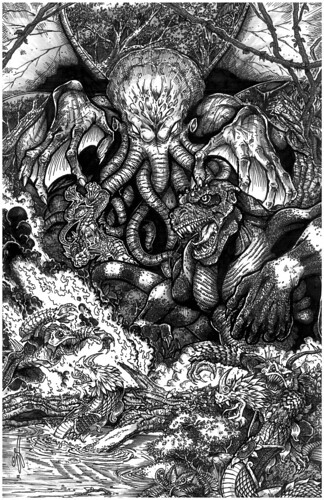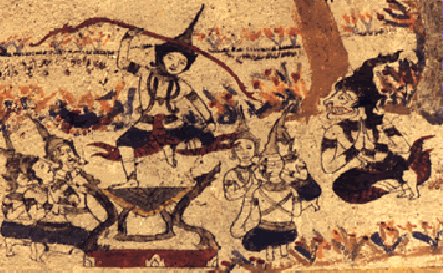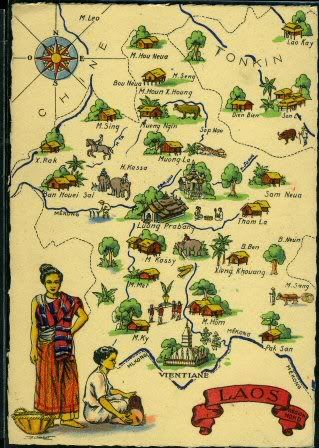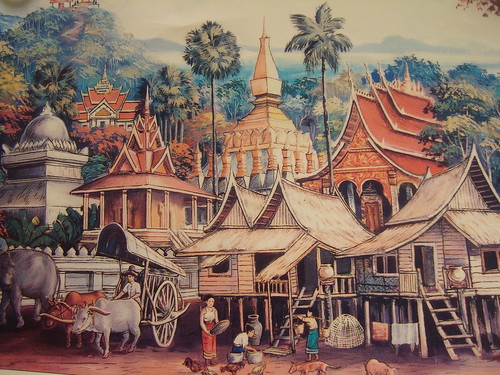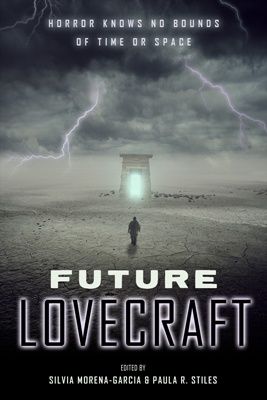We've spoken in the past about the importance of decolonizing time. Not everyone keeps track of time in the same way. It's a little difficult to get a full sense of how Lao observed time in the old days, but here's some initial research that may prove helpful.
It's largely adapted from the Martin Stuart Fox chronology of Lao history, and assuming the standard Asian zodiac. For those of you writing historic Lao fiction and other stories, this may be helpful to get your chronological bearings. The first year listed is the Lao year, the second year is the European/American calendar year.
1896: Foundation of Lan Xang by Fa Ngum. 1353, Year of the Snake.
2022: Vietnamese invade Lan Xang. 1479, Year of the Pig.
2091: Xetthathirat briefly unifies kingdom of Lan Xang and Lan Na. 1548, Year of the Monkey.
2103: Capital moved to Viang Chan from Luang Prabang. 1560, Year of the Monkey.
2106 to 2118: Burmese invasions of Lan Xang. 1563-75, Year of the Ox to Year of the Pig.
2181 to 2238: Reign of Surinyavongsa. 1638-95, Year of the Tiger to Year of the Pig.
2184 to 2185: First Europeans reach Viang Chan. 1641-42, Year of the Snake to Year of the Horse.
2250, 2256: Lan Xang splits into 3 kingdoms. 1707 and 1713, Year of the Pig, Year of the Snake.
2322: All 3 kingdoms become tributaries to Siam. 1779, Year of the Pig.
2369 to 2371: Chao Anouvong’s war of independence.1826-1828, Year of the Dog to Year of the Rat.
2363 to 2383: Earliest Hmong migrations into Laos. 1820-40, Year of the Nak to Year of the Rat.
2404: French explorer Henri Mouhot arrives in Luang Prabang. 1861, Year of the Rooster.
2410: French Mekong Expedition maps rivers through Lao territories. 1867, Year of the Rabbit.
2430: Auguste Pavie, first French vice-consul arrives in Luang Prabang. 1887, Year of the Pig.
2436: French seize Lao territories east of Mekong, ceded by Siam.1893, Year of the Snake.
2442: Administrative reorganization of Laos under Resident Superieur 1899, Year of the Pig.
2444 to 2450: ‘Holy Man Revolt’ in Southern Laos. 1901-07, Year of Ox to Year of the Goat.
2450: Franco-Siamese Treaty establishes modern Lao borders. 1907. Year of the Goat.
2451 to 2453: Leu insurrection in Northern Laos. 1908-10, Year of the Monkey to Year of the Dog.
2457 to 2459. Leu revolt in Luang Namtha and Ho Tai revolt in northeast. 1914-16, Year of the Tiger to Year of the Nak.
2462 to 2465: Hmong insurrection in Northern Laos. 1919-22, Year of the Goat to Year of the Dog.
2466: First session of Indigenous Consultative Assembly. 1923, Year of the Pig.
2484: Franco-Thai war leads to Loss of Lao territories on the West Bank of Mekong. 1941, Year of the Snake.
2488: Lao independence declared. 1945, Year of the Rooster.
2493: US recognizes Laos as an independent state. 1950, Year of the Tiger.
2507 to 2516. Secret bombings of Laos. 1964 to 1973, Year of the Nak to Year of the Ox
2518: End of the War for Laos. 1975, Year of the Rabbit.
2555: Present day. 2012, Year of the Nak.

